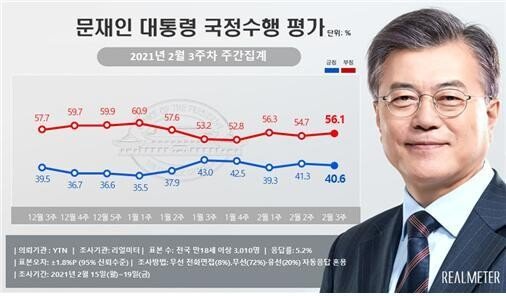On the 22nd, Real Meter, a specialized public opinion poll, announced the results of a poll on President Moon’s state administration on the 15th and 19th at the request of YTN.
In this survey, positive evaluation was counted to 40.6%, down 0.7 percentage points from the previous week, and negative evaluation was 56.1%, up 1.4 percentage points from the previous week. ‘Don’t know, no response’ was 3.3%, down 0.7 percentage points.
The difference between positive evaluation and negative evaluation is 15.5%. In the last week’s survey, negative evaluation, which had collapsed from the top of the rise, rises to the high half of the 50% level again, widening the gap with positive evaluation. In particular, the positive evaluation (42.5% → 34.0% 8.5%p↓) fell sharply in the middle class. The negative evaluation (53.8%→64.4% 10.6%p↑) rose sharply. Realmeter mainly exposed controversy over inspections during the MB administration, the occurrence of North Korean defectors on the Civil Control Line and the failure to alert, the resignation of Supreme Court Chief Kim Myung-soo, and the conflict between Minister Shin Hyun-soo and Min Jeong-soo and Park Bum-gye It was analyzed as having an influence.
Looking at the daily flow, President Moon’s approval rating was 42.9% on the 15th → 40.6% on the 16th →17 days 37.4%→ 38.9% on the 18th → 42.7% on the 19th.
The 17th, which fell sharply, was the day when the Blue House publicly confirmed the statement of chief executive Shin.
By age group, they fell in their 30s (5.9%p↓, 46.2%→40.3%, negative evaluation 56.1%), 60s (1.6%p↓, 34.9%→33.3%, negative evaluation 63.4%), and 70s and older (1.9%) It rose in p↑, 32.9%→34.8%, negative evaluation 60.3%), and 50s (1.5%p↑, 42.3%→43.8%, negative evaluation 54.5%).
By gender, women (2.5%p↓, 43.8%→41.3%, negative evaluation 54.7%) fell down, and men (1.1%p↑, 38.8%→39.9%, negative evaluation 57.4%) increased.
By region, Daejeon, Sejong, and Chungcheong (5.3%p↓, 45.0%→39.7%, negative evaluation 59.1%), Seoul (2.9%p↓, 41.5%→38.6%, negative evaluation 57.4%), Busan, Ulsan, Gyeongnam ( It fell from 1.0%p↓, 35.9%→34.9%, negative evaluation 59.9%), while Gwangju and Jeolla (3.0%p↑, 57.9%→60.9%, negative evaluation 35.9%), Daegu and Gyeongbuk (1.8%p↑, 25.7) %→27.5%, and negative evaluation 68.7%).
The party’s approval rating was 31.8%, a 0.7 percentage point increase from the previous survey, and the Democratic Party’s 1.4 percentage point to 31.6%.
The People’s Party rose 1.2 percentage points to 7.9%, the Open Democratic Party fell 0.7 percentage points to 6%, the Justice Party fell 0.6 percentage points to 4.7%, and the Basic Income Party rose 0.3 percentage points to 1%. The number of shamans was 14.4% unchanged compared to the second week of February.
This survey was conducted by randomly making calls through a randomly generated sampling frame in parallel with wireless telephones (80%) and landline telephones (20%). As a result of attempting a call to 58,045 voters over the age of 18, the final 3010 responses were completed, resulting in a response rate of 5.2%. The sample error is ±1.8%p at the 95% confidence level. For detailed survey summary and results, refer to the Real Meter homepage or the Central Election Survey Deliberation Committee homepage.
Park Tae-geun, Dong-A.com reporter [email protected]
Copyright by dongA.com All rights reserved.
—
–


